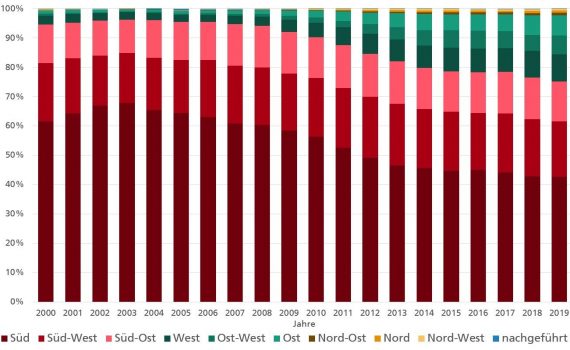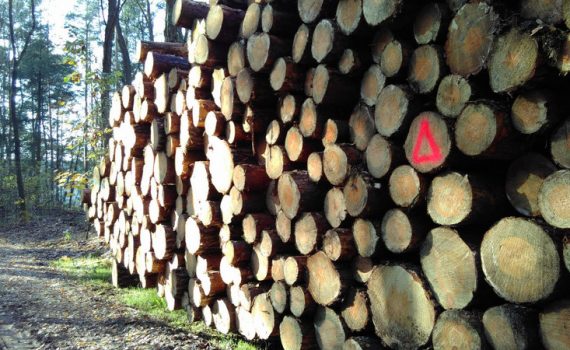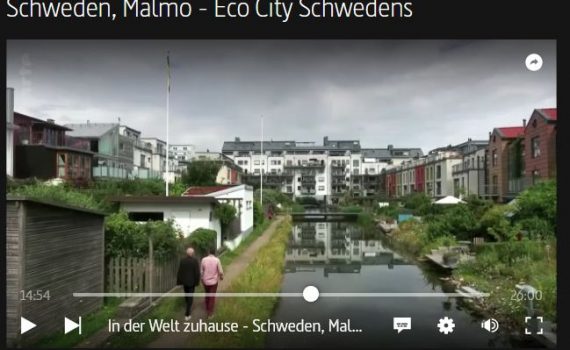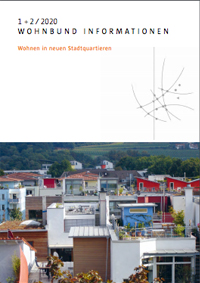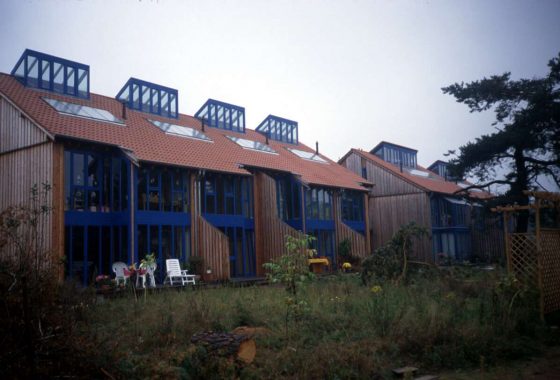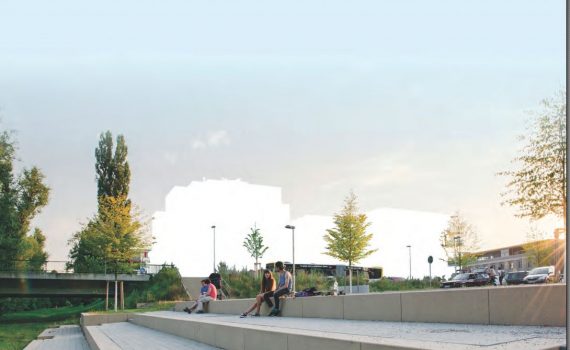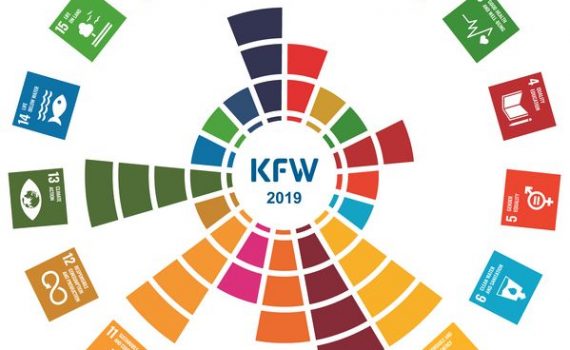Wenn ganze Quartiere klimafreundlich gebaut oder saniert werden, wird auf einen Schlag viel CO2 eingespart. Besonders gelungene Projekte zeichnet das Land Nordrhein-Westfalen mit dem Siegel KlimaQuartier.NRW aus. Nun zeigen drei neu ausgezeichnete KlimaQuartiere.NRW in Düsseldorf und Leopoldshöhe, wie der Gebäudebereich zur Wärmewende beitragen kann. Eines haben alle Projekte gemeinsam: Sie […]
Kategorie für Blog: Settlements
The Federal Cabinet today approved the draft of a timber construction initiative presented by Federal Minister of Construction Klara Geywitz and Federal Minister of Agriculture Cem Özdemir. This strategy of the Federal Government is intended to strengthen the use of wood as a sustainable raw material in the construction sector and to ensure more climate protection, resource efficiency and faster construction. With eight fields of action, from the exemplary role of the federal government and the strengthening of research and innovation, to securing skilled labour and knowledge transfer, to securing the supply of raw materials, the use of wood is to be significantly improved and the timber construction quota increased by 2030.
 The Federal Ministry of Transport, Building and Urban Affairs is supporting the climate-friendly construction of new buildings with a new funding programme that will start on 1 March 2023. For the first time, the entire life cycle of a building will be considered - from construction to operation to potential deconstruction in the distant future. The buildings are characterised by low greenhouse gas emissions in the life cycle, high energy efficiency, low operating costs and a high proportion of renewable energies for the generation of heat and electricity. This funding thus makes a contribution to climate protection and to meeting national climate targets.
The Federal Ministry of Transport, Building and Urban Affairs is supporting the climate-friendly construction of new buildings with a new funding programme that will start on 1 March 2023. For the first time, the entire life cycle of a building will be considered - from construction to operation to potential deconstruction in the distant future. The buildings are characterised by low greenhouse gas emissions in the life cycle, high energy efficiency, low operating costs and a high proportion of renewable energies for the generation of heat and electricity. This funding thus makes a contribution to climate protection and to meeting national climate targets.
Adjusted for inflation, construction volume will decline in 2022 - Price development and rising interest rates will continue to have a severe impact on the construction industry in the years to come - New residential construction will slump more than the overall construction volume - Policymakers will have to change their strategy in order to achieve their goals for the creation of new housing and energy-efficient building renovation in the medium term
The first results of the timber housing study will be presented at the 15th Congress on Efficient Building with Wood in Urban Areas on 19 October 2022 in Cologne. So far, 118 large-volume housing projects with more than 100 units have been identified across Europe by the HFR researchers, 47 of which are located in Germany. Final results will be presented in early December at the 26th International Timber Construction Forum in Innsbruck on 30 November 2022 and will also be published in a brochure by Informationsdienst Holz.
Statement by Klara Geywitz on the 2022 budget and the key figures of the financial planning until 2026 The draft budget for 2022 and the key figures of the financial planning up to 2026 provide for a total of 14.5 billion euros in programme funds for social housing. This will support the construction of 100,000 social housing units per year. That is more than three times the original financial planning, which had earmarked four billion euros by 2025. The 2022 budget will lay the foundation for planning with two billion euros.
 After a significant decline in the previous year, greenhouse gas emissions in Germany are on the rise again. Thus, around 762 million tonnes of greenhouse gases were released in 2021 - a good 33 million tonnes or 4.5 percent more than in 2020. Overall, emissions in Germany have thus fallen by 38.7 percent since 1990. The increase in the last year is particularly noticeable in the energy sector: This shows an increase of 27 million tonnes CO2-equivalents, as increased demand for electricity, lower electricity generation from renewable energies and the higher gas price led to increased use of coal for electricity generation. Electricity generation from renewables fell by seven per cent, mainly due to poor wind conditions. In the transport and building sectors, emissions were above the annual ceilings set by the Federal Climate Protection Act. This is shown by the latest calculations of the Federal Environment Agency (UBA), which are based on the specifications of the Federal Climate Protection Act and the EU-Renewable Energy Directive (RED) were presented today.
After a significant decline in the previous year, greenhouse gas emissions in Germany are on the rise again. Thus, around 762 million tonnes of greenhouse gases were released in 2021 - a good 33 million tonnes or 4.5 percent more than in 2020. Overall, emissions in Germany have thus fallen by 38.7 percent since 1990. The increase in the last year is particularly noticeable in the energy sector: This shows an increase of 27 million tonnes CO2-equivalents, as increased demand for electricity, lower electricity generation from renewable energies and the higher gas price led to increased use of coal for electricity generation. Electricity generation from renewables fell by seven per cent, mainly due to poor wind conditions. In the transport and building sectors, emissions were above the annual ceilings set by the Federal Climate Protection Act. This is shown by the latest calculations of the Federal Environment Agency (UBA), which are based on the specifications of the Federal Climate Protection Act and the EU-Renewable Energy Directive (RED) were presented today.
[caption id="attachment_28516" align="alignleft" width="560"] Award-winning project "Stadt Landschaft Burg" of the Federal Prize 2020 - © Bundespreis Stadtgrün / Hergen Schimpf[/caption]
The Federal Ministry of Housing, Urban Development and Building today announced the Federal Urban Green Award 2022. This year, the focus is on the topic of "Climate adaptation and quality of life".
Federal Minister Klara Geywitz: "Climate change is a stress test for our cities. We need more trees for a better urban climate, we need soils that can absorb heavy rainfall, we need less sealed surfaces for more biodiversity and to prevent residential neighbourhoods from heating up. With the Federal Urban Green Award 2022, we are honouring the pioneering work that is already shaping the necessary transformation of cities."
Award-winning project "Stadt Landschaft Burg" of the Federal Prize 2020 - © Bundespreis Stadtgrün / Hergen Schimpf[/caption]
The Federal Ministry of Housing, Urban Development and Building today announced the Federal Urban Green Award 2022. This year, the focus is on the topic of "Climate adaptation and quality of life".
Federal Minister Klara Geywitz: "Climate change is a stress test for our cities. We need more trees for a better urban climate, we need soils that can absorb heavy rainfall, we need less sealed surfaces for more biodiversity and to prevent residential neighbourhoods from heating up. With the Federal Urban Green Award 2022, we are honouring the pioneering work that is already shaping the necessary transformation of cities."
The property developer WvM Immobilien + Projektentwicklung GmbH and the eco-energy supplier NATURSTROM AG found the joint company Green Estate. With the fusion of energy and real estate know-how, the partners are taking a new path to enable people to live sustainably.
 The new National Progress Report on the Implementation of the New Urban Agenda shows the state of sustainability in urban development in German municipalities. The report was prepared by the German Institute of Urban Affairs on behalf of the Federal Institute for Research on Building, Urban Affairs and Spatial Development (BBSR).
The new National Progress Report on the Implementation of the New Urban Agenda shows the state of sustainability in urban development in German municipalities. The report was prepared by the German Institute of Urban Affairs on behalf of the Federal Institute for Research on Building, Urban Affairs and Spatial Development (BBSR).
 In a recently written short study, scientists from the Department of Energy System Analysis at the Fraunhofer Institute for Solar Energy Systems ISE prepared an evaluation of the Market Master Data Register (MaStR) and the EEG system master data for photovoltaics (PV). Important findings of the analyses were that with 38 percent of the newly installed capacity, the increase in capacity in Germany is increasingly taking place in the segment of rooftop systems larger than 100 kW, 22 percent of the newly built PV systems are erected in a west, east or east-west direction and 19 percent of these systems have tilt angles smaller than 20 degrees.
In a recently written short study, scientists from the Department of Energy System Analysis at the Fraunhofer Institute for Solar Energy Systems ISE prepared an evaluation of the Market Master Data Register (MaStR) and the EEG system master data for photovoltaics (PV). Important findings of the analyses were that with 38 percent of the newly installed capacity, the increase in capacity in Germany is increasingly taking place in the segment of rooftop systems larger than 100 kW, 22 percent of the newly built PV systems are erected in a west, east or east-west direction and 19 percent of these systems have tilt angles smaller than 20 degrees.
Exploit potential at neighbourhood level!
The KfW programme "Energy-efficient urban refurbishment" promotes integrated energy-efficient neighbourhood concepts and refurbishment management with programme part 432. Programme parts 201 and 202 provide investment support for cross-building and infrastructural supply systems. The Federal Ministry of the Interior, for Building and the Home Affairs provides the funding for the energy refurbishment process from the individual building to the neighbourhood from the Energy and Climate Fund (EKF). "The raw material wood is precious. It is therefore important to use it responsibly and in a way that conserves resources," warns Peter Aicher, Chairman of Holzbau Deutschland. Even if wood is affected by environmental influences or the bark beetle, it does not represent an inferior raw material, but has almost identical properties to conventional construction timber. "If the so-called 'calamity wood' has the same structural quality in terms of load-bearing capacity as conventional sawn timber, it can be used without restrictions," explains Aicher. In addition, the wood retains its important function as a CO2 sink, regardless of external impairments.
"The raw material wood is precious. It is therefore important to use it responsibly and in a way that conserves resources," warns Peter Aicher, Chairman of Holzbau Deutschland. Even if wood is affected by environmental influences or the bark beetle, it does not represent an inferior raw material, but has almost identical properties to conventional construction timber. "If the so-called 'calamity wood' has the same structural quality in terms of load-bearing capacity as conventional sawn timber, it can be used without restrictions," explains Aicher. In addition, the wood retains its important function as a CO2 sink, regardless of external impairments.
 "New large-scale construction projects and ecological innovations have ensured that Malmö is now a prime example of the direct transition from an industrial metropolis to a sustainable eco city. The secret recipe: the city not only relied on innovative technologies, but above all on the active participation of citizens in the transformation."
"New large-scale construction projects and ecological innovations have ensured that Malmö is now a prime example of the direct transition from an industrial metropolis to a sustainable eco city. The secret recipe: the city not only relied on innovative technologies, but above all on the active participation of citizens in the transformation."
A new study from Denmark takes a look at the costs of sustainable building construction and shows that more sustainable does not automatically mean more expensive. On the contrary. The study by Buus Consult on behalf of the DGNB system partner from Denmark, the Green Building Council Denmark, now provides clarity. In the study, it takes a close look at 37 DGNB-certified buildings.
 The ecological model settlement on a former barracks site in Munich sets new standards in timber construction. Various timber construction methods and building types up to seven storeys are being tested side by side in eight building projects with the aim of a final scientific evaluation. Timber frame, timber frame and timber hybrid construction methods are being used.
The ecological model settlement on a former barracks site in Munich sets new standards in timber construction. Various timber construction methods and building types up to seven storeys are being tested side by side in eight building projects with the aim of a final scientific evaluation. Timber frame, timber frame and timber hybrid construction methods are being used.
 Wohnungsbaugenossenschaft Neues Berlin and Berliner Stadtwerke have agreed on another joint tenant power project. Six solar power systems with an output of around 500 kilowatts are being built in the Mühlengrund housing estate in Hohenschönhausen. Tenants of more than 1,100 apartments will soon be able to benefit from green electricity from their own roofs.
Wohnungsbaugenossenschaft Neues Berlin and Berliner Stadtwerke have agreed on another joint tenant power project. Six solar power systems with an output of around 500 kilowatts are being built in the Mühlengrund housing estate in Hohenschönhausen. Tenants of more than 1,100 apartments will soon be able to benefit from green electricity from their own roofs.
 Glaciers are melting, sea levels are rising, heat waves and heavy rainfall are increasing: The consequences of climate change are visible and tangible worldwide, and the window of opportunity to act is shrinking. In order to significantly limit the global effects of climate change, the emission of greenhouse gases on earth must be drastically reduced. The agreement reached by the international community in Paris in 2015 sets the goal of limiting global warming to well below 2 degrees Celsius, but preferably to 1.5 degrees Celsius. Now, the Wuppertal Institute presented a study with possible cornerstones that can help to achieve the 1.5 degree target by 2035. The study shows that a climate-neutral energy system by 2035 is very ambitious, but in principle feasible, provided that all possible strategies from today's perspective are bundled. This requires, above all, bringing forward and intensifying measures that are described in many studies as necessary to achieve greenhouse gas neutrality by 2050.
Glaciers are melting, sea levels are rising, heat waves and heavy rainfall are increasing: The consequences of climate change are visible and tangible worldwide, and the window of opportunity to act is shrinking. In order to significantly limit the global effects of climate change, the emission of greenhouse gases on earth must be drastically reduced. The agreement reached by the international community in Paris in 2015 sets the goal of limiting global warming to well below 2 degrees Celsius, but preferably to 1.5 degrees Celsius. Now, the Wuppertal Institute presented a study with possible cornerstones that can help to achieve the 1.5 degree target by 2035. The study shows that a climate-neutral energy system by 2035 is very ambitious, but in principle feasible, provided that all possible strategies from today's perspective are bundled. This requires, above all, bringing forward and intensifying measures that are described in many studies as necessary to achieve greenhouse gas neutrality by 2050.
 The Institute for Urban Planning and Social Research WEEBER+PARTNER (Stuttgart) examined 16 case studies and interviewed responsible persons in municipal, cooperative and private housing companies. The projects are characterized by a wide range of planning and construction approaches. According to the study, social diversity requires structural diversity: Rental, social and owner-occupied apartments of different sizes and with diverse layouts were created in the new housing quarters. They are socially mixed - even within buildings - with the respective proportions in the neighbourhood being derived from local requirements. The new quarters also offer space for communal forms of living, for example for older people and those in need of care. And they are characterised by an attractively designed and green residential environment. Concept awards promote the planning and implementation of such projects: Through them, plots of land are not allocated according to the highest price, but for the best concept.
The Institute for Urban Planning and Social Research WEEBER+PARTNER (Stuttgart) examined 16 case studies and interviewed responsible persons in municipal, cooperative and private housing companies. The projects are characterized by a wide range of planning and construction approaches. According to the study, social diversity requires structural diversity: Rental, social and owner-occupied apartments of different sizes and with diverse layouts were created in the new housing quarters. They are socially mixed - even within buildings - with the respective proportions in the neighbourhood being derived from local requirements. The new quarters also offer space for communal forms of living, for example for older people and those in need of care. And they are characterised by an attractively designed and green residential environment. Concept awards promote the planning and implementation of such projects: Through them, plots of land are not allocated according to the highest price, but for the best concept.
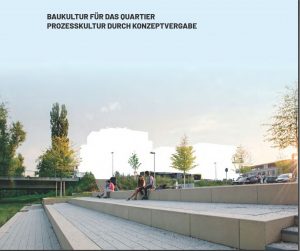 Conceptual procedures are increasingly establishing themselves as a further instrument of municipal land policy for locations with development potential. Here, the property is not allocated according to the highest price, but according to the concept that promises the most sustainable approaches to the further development of the neighbourhood. In this way, the procedures offer municipalities approaches to solving two current and urgent problems: the need for high-quality urban development and affordable housing.
Conceptual procedures are increasingly establishing themselves as a further instrument of municipal land policy for locations with development potential. Here, the property is not allocated according to the highest price, but according to the concept that promises the most sustainable approaches to the further development of the neighbourhood. In this way, the procedures offer municipalities approaches to solving two current and urgent problems: the need for high-quality urban development and affordable housing.
"The world's water resources are currently facing the greatest threat in the history of mankind," write aquatic ecologists in their recently published statement paper. More than one hundred professional societies of aquatic ecosystem research around the globe have signed the joint statement. In it, the researchers show the dramatic effects that climate change is having on aquatic ecosystems worldwide. They call for immediate concerted action by politics, business, science and society to halt the progress of climate change.
Via the new feature you will get a message by email when there are new posts in the sdg21.web database. sdg21 news subscription Sent with the latest content weekly on Tuesday at 9:00 am when there is something new on sdg21.eu. All subscription options can be found at: http://sdg21.eu/sdg21-news-abonnieren
Climate protection is important to over 80 percent of Germans - but this should not be reflected in higher rental costs. In order to increase the acceptance of energy-efficient renovations, Deutsche Wohnen has developed a model of how climate protection and social compatibility can come together. The "Concept for Socially Compatible Climate Protection in the Building Sector" aims to significantly increase the rate of refurbishment in existing buildings in order to achieve national climate protection targets. At the same time, an economic stimulus package worth billions is being initiated.
On 18 June 2020, the German Bundestag passed the Building Energy Act (GEG) in its third reading. With this law, the federal government is combining the existing requirements of the Energy Saving Ordinance (EnEV), the Renewable Energies Heat Act (EEWärmeG) and the Energy Saving Act (EnEG). For the information programme Zukunft Altbau (Future of Old Buildings), which is supported by the Baden-Württemberg Ministry of the Environment, the specifications of the new law are not ambitious enough. To bring climate-friendly building and renovation nationwide on the way is not possible in the future. "The legislator has missed it to introduce more demanding standards," says Frank Hettler of Zukunft Altbau. "For a sustainable building stock in Germany, however, these are urgently needed to achieve the climate targets." The GEG will now be forwarded to the Bundesrat, which, however, does not require approval, and is expected to come into force by the end of the year.
The parliament of Bremen wants to oblige the use of solar energy on all new and existing buildings in Bremen and Bremerhaven. Whenever the roof surface is completely renewed, they are to be equipped with a solar system in the future. This is photovoltaics and, if necessary, also solar thermal energy. The Senate is currently examining the latter.
State government launches climate protection support programme for citizens
Environment Minister Jan Philipp Albrecht today presented the state's new funding programme for private investment in climate protection. It starts on Tuesday, 9 June, and includes a bundle of support measures. Funding is available for the purchase of cargo bikes, e-charging stations, electricity storage systems, photovoltaic balcony systems, solar thermal systems, non-fossil heating systems and rainwater cisterns. The installation of a district heating connection and the installation of a green roof are also subsidised.Council of Ministers approves bill to amend state building code
In its meeting on 26 May 2020, the Rhineland-Palatinate Council of Ministers approved in principle a draft bill to amend, among other things, the Rhineland-Palatinate Building Code. The amendment of the state building code is intended to implement changes to the so-called model building code that have already been adopted or are in preparation. To ensure that significantly more houses in Hamburg are greened with plants on roofs and facades, the environmental authority is making €500,000 in funding available from 1 June. A maximum of € 100,000 and up to 40 % of the costs, applicants can receive in future in grants. Applications can be made from construction costs of €1,000. Funding will be provided for ground and wall-based greening of new and existing buildings, preparatory work, climbing aids, plants, planting measures, irrigation systems, completion maintenance and the ancillary costs for professional planning and supervision.
To ensure that significantly more houses in Hamburg are greened with plants on roofs and facades, the environmental authority is making €500,000 in funding available from 1 June. A maximum of € 100,000 and up to 40 % of the costs, applicants can receive in future in grants. Applications can be made from construction costs of €1,000. Funding will be provided for ground and wall-based greening of new and existing buildings, preparatory work, climbing aids, plants, planting measures, irrigation systems, completion maintenance and the ancillary costs for professional planning and supervision.
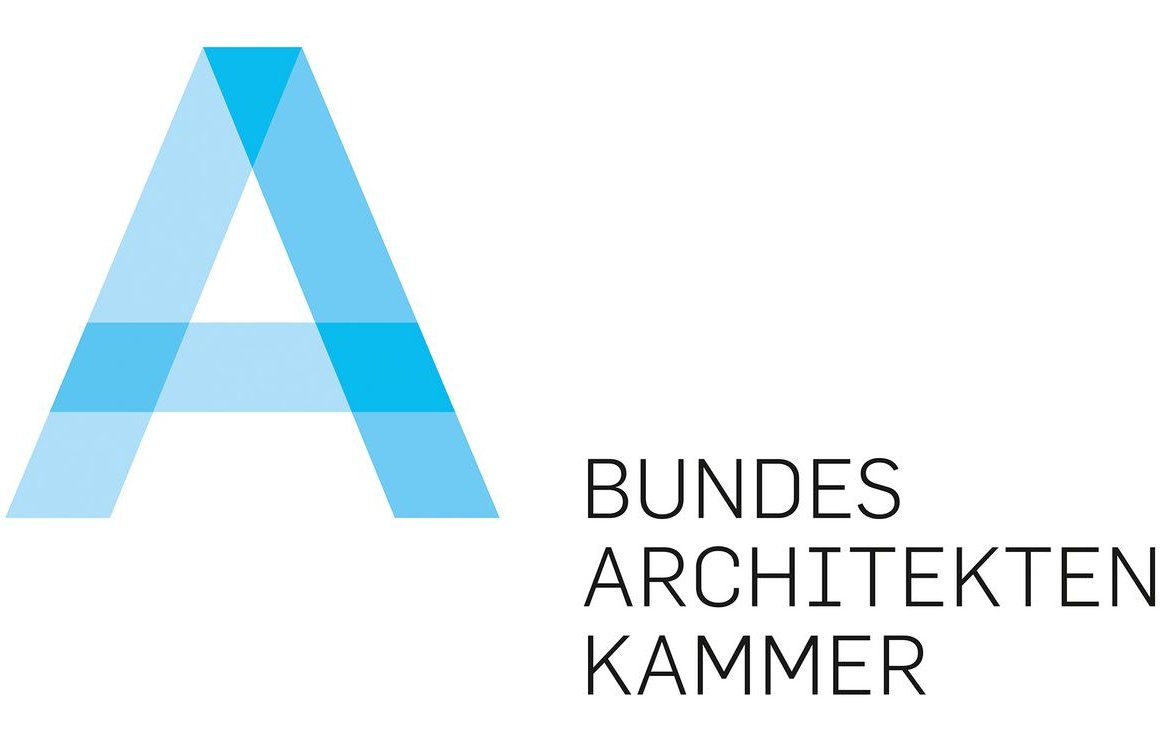 The Federal Chamber of Architects (BAK) and the Federal Foundation of Baukultur presented their proposal for a "Baukultur Innovation Programme" to politicians in Berlin today on behalf of the planning and construction industry.
Anne Katrin Bohle, State Secretary at the Federal Ministry of the Interior, Building and Community, accepted the four-point plan. In it, the authors suggest measures to overcome the coronavirus crisis that will have a lasting economic and social impact.
The Federal Chamber of Architects (BAK) and the Federal Foundation of Baukultur presented their proposal for a "Baukultur Innovation Programme" to politicians in Berlin today on behalf of the planning and construction industry.
Anne Katrin Bohle, State Secretary at the Federal Ministry of the Interior, Building and Community, accepted the four-point plan. In it, the authors suggest measures to overcome the coronavirus crisis that will have a lasting economic and social impact.
 In research, neighbourhoods have been recognised as an important level of action for climate protection. For this reason, the BMBF, BMU and the Federal Ministry of Building and Transport have funded several research projects on sustainable neighbourhoods, which are now being worked on. The consensus of the research projects presented and the funding bodies is that it is important to research neighbourhood concepts for a climate-friendly heat and electricity supply as well as an environmentally friendly mobility offer in an economical way" and "to link the individual elements in the sense of a functioning sector coupling in a meaningful way."
The focus articles in the "Ecological Economy 3/2019" issue highlight the potential of the neighbourhood approach for the implementation of climate protection measures, but also present best practice examples and discuss feasibility in practice.
In research, neighbourhoods have been recognised as an important level of action for climate protection. For this reason, the BMBF, BMU and the Federal Ministry of Building and Transport have funded several research projects on sustainable neighbourhoods, which are now being worked on. The consensus of the research projects presented and the funding bodies is that it is important to research neighbourhood concepts for a climate-friendly heat and electricity supply as well as an environmentally friendly mobility offer in an economical way" and "to link the individual elements in the sense of a functioning sector coupling in a meaningful way."
The focus articles in the "Ecological Economy 3/2019" issue highlight the potential of the neighbourhood approach for the implementation of climate protection measures, but also present best practice examples and discuss feasibility in practice.
- Over EUR 28 billion for "climate protection measures": KfW is one of the most important supporters of the Paris climate goals
- Promotional bank is a global pioneer with its standardised SDG mapping
- Strong international interest in KfW SDG mapping
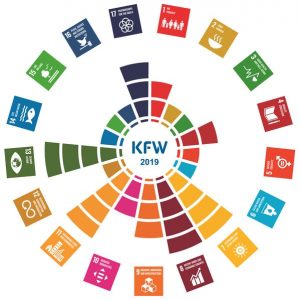 KfW is today publishing the results of the SDG mapping of new commitments throughout the Group in 2019. In order to clarify the individual contribution made by KfW's new commitments to achieving the UN Sustainable Development Goals, KfW has developed a standardised procedure: 1,500 indicators are used each year to determine to which SDGs KfW's new commitments can be assigned. This makes the contribution transparent at both group and business sector level.
KfW is today publishing the results of the SDG mapping of new commitments throughout the Group in 2019. In order to clarify the individual contribution made by KfW's new commitments to achieving the UN Sustainable Development Goals, KfW has developed a standardised procedure: 1,500 indicators are used each year to determine to which SDGs KfW's new commitments can be assigned. This makes the contribution transparent at both group and business sector level.The federal government can give a short-term boost to public housing construction in Germany and thus help to ease the acute housing shortage in many large cities. The key to this is three federally owned companies that provide flexible support to the federal states and local authorities in the development of construction projects and the construction of new housing: Firstly, a consultancy company that provides planning capacities to cities and municipalities. Secondly, a land fund that provides financial and conceptual support to local authorities nationwide in acquiring building land and financing infrastructure. Thirdly, an investment company that strengthens the equity of municipal housing construction companies through financial participation. Prof Dr Sebastian Dullien, Scientific Director of the Institute for Macroeconomics and Economic Research (IMK) at the Hans Böckler Foundation, and Prof Dr Tom Krebs from the University of Mannheim show this in a new concept for a federal "Future Housing" initiative.
Funding is available for greening facades and roofs as well as for unsealing on private, public and commercial properties in the Hannover city area.
From 2022, all new public buildings must be made of at least 50 per cent wood or other sustainable building materials. For buildings with more than eight storeys, the supporting structure must even be made entirely of wood. It was also decided that 90 ecological neighbourhoods and 100 urban farms will be built in Paris.





